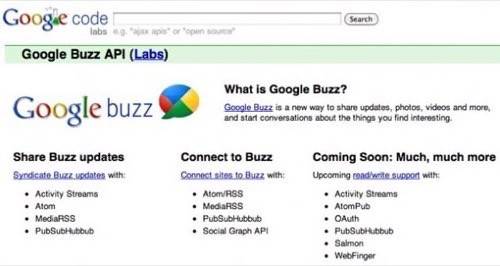Google rolled out a social stream service today called Buzz. It looks on the surface like Facebook, FriendFeed and other stream reading and writing services. It will compete with Facebook and Twitter. Under the covers, though, this major product was built by a team of people taking a radical new approach to online publishing: Buzz is all about open, standardized user data.

Google Buzz data can be syndicated out to other services using the standard data formats called Atom, Activity Streams, MediaRSS and PubSubHubbub. That couldn’t be more different from Facebook. Google has taken open data standards to battle against a marketplace of competitors that are closed and proprietary to varying degrees. This is a very big deal.
ReadWriteWeb’s full coverage and analysis of Google Buzz:
Google Buzz was presented as a destination site, but a look at its APIs and developer roadmap indicate that it may actually intend to be a platform – the central hub for a world of distributed social networking. “This is a downpayment on where we’re going with the open, social web,” Google Open Web Advocate Chris Messina told us.
It’s tempting to recoil at the thought of Google powering one more part of our lives online, and our friends’ activity streams are a very important part of the online experience now. But if the growing number of data portability and open web advocates the company has hired can do their jobs well – then Google Buzz could be a big force for good.

People will build services on top of analyzing your public Buzz activity. They will build new applications for publishing to Buzz, just like the Twitter ecosystem has today. Planned support for things like the Salmon commenting standard mean that comments left on Buzz could appear out on blog posts around the web, and comments on blog posts could be viewed inside of Buzz when the post links are shared.
The use of full email addresses in @ public replies demonstrated today seems to indicate that it will be a cross-platform messaging service. Facebook users can only message other Facebook users but Buzz users may be able to reply to people using email IDs from other networks. That’s hot stuff.
Once Activity Streams consumption, @ messages that look like Webfinger profiles to me and Salmon are in place then Buzz users should be able to read, comment on and message to conversations with people who have never seen Buzz in their lives, simply by subscribing to their feeds. There’s huge potential for interoperability here.
Facebook and Twitter will face renewed pressure to publish and consume standardized data feeds as well now. If Buzz is big enough, it could break the dam holding back a flood of standardized data. Where there is standized data, there is scalable network effects, consumer choice, competition and thus innovation.
Buzz’s embrace of the open web could make it a very important player in the development of the future.
Update: One critique to take into consideration is this. Google has scooped up a substantial number of formerly independent open web advocates – most recently Chris Messina, who was the leading spokesperson for the Activity Streams standard. See How Chris Messina Got a Job at Google. In that article we included the following argument from Yahoo’s Eran Hammer-Lahav, the best-known technologist working to develop and support open login standard OAuth. This perspective is important to consider in thinking about the Buzz announcement and standards.
“This is clearly a big win for Google,” Hammer-Lahav told us.
“Messina and Smarr are huge assets in the social web space. My concern is specific to Google. With Messina, Smarr, [inventor of OpenID and more Brad] Fitzpatrick and others all working for Google, focusing on the Social Web, there is less and less incentive for Google to reach out. Google has a strong coding culture which puts running code ahead of consensus and collaboration. Now with so many bright minds in house, they are even less likely to reach out. A week ago, you would have to get at least Google, Plaxo, and Messina (representing the independent voice) to collaborate. This week it’s just Google.
“While I am certain that Messina and Smarr will keep their independent voices, and am not suggesting they will ‘sell out’ or alter their principles, they no longer need to surface many of their ideas out to the community. They can just have an quick internal meeting and ship products.”
Is Google centralizing too much of the decision making about the future of an ostensibly decentralized web? Time will tell, but this may be the heart of the battle for the future of the social web.





















